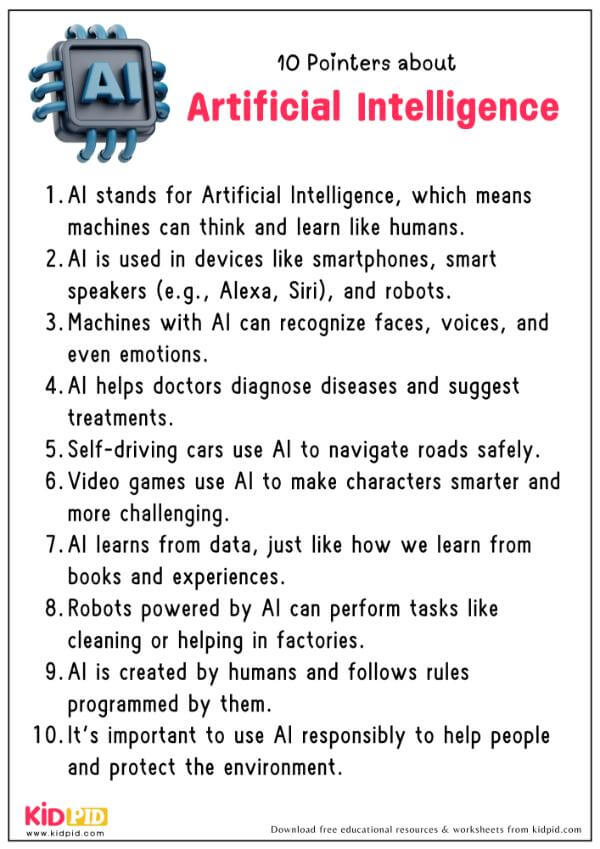Essay on AI shows how artificial intelligence is reshaping human life, work, and society.
Artificial Intelligence (AI) is the development of machines that can think, learn, and perform tasks like humans. It plays a major role in our daily lives, from smartphones to smart cars, revolutionizing industries and transforming how we work and live. This essay examines key points and questions related to AI.
10 Pointers about Artificial Intelligence (AI)

- AI stands for Artificial Intelligence, which means machines can think and learn like humans.
- AI is used in devices like smartphones, smart speakers (e.g., Alexa, Siri), and robots.
- Machines with AI can recognize faces, voices, and even emotions.
- AI helps doctors diagnose diseases and suggest treatments.
- Self-driving cars use AI to navigate roads safely.
- Video games use AI to make characters smarter and more challenging.
- AI learns from data, just like how we learn from books and experiences.
- Robots powered by AI can perform tasks like cleaning or helping in factories.
- AI is created by humans and follows rules programmed by them.
- It’s important to use AI responsibly to help people and protect the environment.
Short Essay On Artificial Intelligence
Essay On Artificial Intelligence in 100 Words

Artificial Intelligence, or AI, is a specialized technology that enables machines to think and act like humans. For example, when you talk to Siri or Alexa, they understand your words because of AI. AI can also recognize pictures, play games, and even drive cars! Doctors use AI to diagnose illnesses more quickly, and teachers utilize it to create engaging learning apps. Robots with AI can clean houses or work in factories. However, AI doesn’t have feelings like humans do—it only follows instructions given by programmers. While AI makes life easier, we must use it wisely so it helps everyone.
Essay On Artificial Intelligence in 200 Words

Artificial Intelligence, or AI, is an amazing technology that allows machines to think and learn like humans. Have you ever wondered how your phone knows what you’re saying? That’s AI at work! Smart assistants like Siri, Google Assistant, and Alexa use AI to listen, understand, and respond to your questions.
AI isn’t just for talking devices; it’s everywhere! In hospitals, AI helps doctors spot diseases quickly by analyzing X-rays and scans. In schools, AI creates personalized lessons for students. Even video games use AI to make characters smarter and more exciting to play against. Self-driving cars rely on AI to avoid accidents and follow traffic rules.
But how does AI learn? It uses something called “machine learning.” This means AI looks at lots of examples, like photos or sounds, and improves over time. For instance, if you show AI many pictures of cats, it will eventually recognize a cat on its own.
While AI is helpful, it’s essential to remember that humans create and control it. We must ensure AI is used responsibly to benefit everyone.
Essay On Artificial Intelligence in 300 Words
Artificial Intelligence, or AI, is a fascinating technology that helps machines think, learn, and solve problems like humans. You might already interact with AI every day without realizing it! When you ask Siri or Alexa a question, they use AI to understand and answer you. These smart assistants are just one example of how AI makes our lives easier.
AI is also used in many other areas. In hospitals, AI helps doctors diagnose illnesses by studying X-rays and medical reports. It can even predict which treatments might work best for patients. Teachers use AI-powered apps to create fun quizzes and lessons tailored to each student’s needs. In factories, robots with AI assemble products quickly and accurately. And did you know that self-driving cars use AI to detect obstacles and stay safe on the road?
One of the coolest things about AI is how it learns. Through a process called “machine learning,” AI studies huge amounts of data to improve itself. For example, if you show AI thousands of pictures of dogs, it will eventually recognize any dog it sees. But AI doesn’t have feelings or creativity—it only follows patterns and rules set by humans.
While AI has many benefits, it’s crucial to use it carefully. If not controlled properly, AI could cause harm instead of helping. Scientists are working hard to ensure AI remains safe and ethical. In the future, AI might help us explore space, cure diseases, and invent new technologies. The possibilities are endless!
Long Essay On Artificial Intelligence in 500 Words
Introduction
Artificial Intelligence (AI) is one of the most groundbreaking technologies of our time. It refers to the ability of machines to mimic human intelligence, enabling them to think, learn, and solve problems. AI is rapidly changing various aspects of our lives, from healthcare to entertainment. This essay explores what AI is, its applications, benefits, challenges, and prospects.
What is Artificial Intelligence?
At its core, AI encompasses a range of technologies that allow machines to perform tasks typically requiring human intelligence. These tasks include understanding natural language, recognizing patterns, and making decisions. AI systems can learn from data, adapt to new inputs, and improve over time. The most common form of AI today is Narrow AI, which is designed to perform specific tasks, such as facial recognition or playing chess. In contrast, General AI, which remains largely theoretical, would possess the ability to understand and learn any intellectual task that a human can.
Applications of AI
AI is integrated into numerous fields, enhancing efficiency and effectiveness.
- Healthcare: AI algorithms analyze medical data to assist doctors in diagnosing diseases and predicting patient outcomes. For example, AI can interpret medical images and flag anomalies that may require further investigation.
- Education: AI-powered educational tools personalize learning experiences for students. Chatbots and adaptive learning platforms enable students to learn at their own pace, providing customized resources tailored to their individual needs.
- Transportation: Self-driving cars utilize AI to navigate roads safely. They process vast amounts of data from sensors to make real-time decisions, significantly reducing the risk of human error.
- Entertainment: AI enhances user experience by recommending movies, music, and games based on individual preferences, making content consumption more engaging and personalized.
Benefits of AI
The advantages of AI are numerous. First, it automates repetitive tasks, freeing up human workers to focus on more complex responsibilities. This efficiency can lead to increased productivity across various sectors. Second, AI improves accuracy in fields such as medicine by analyzing data more precisely than humans can. Additionally, AI technologies can help tackle global challenges, such as climate change and food security, by optimizing resource usage and predicting outcomes.
Challenges of AI
Despite its many benefits, AI also presents challenges. One significant concern is job displacement; as AI systems become more capable, they may replace human workers in certain tasks. This could lead to economic inequality and social unrest if alternative employment opportunities are not created. Another issue is the potential for bias in AI algorithms, which can occur if the data used to train these systems is flawed or unrepresentative. Moreover, privacy and security concerns arise, as AI systems often require access to personal data.
Future of AI
The future of AI holds immense potential. As technology advances, AI is expected to play an even more prominent role in solving complex problems and enhancing our daily lives. However, it is crucial to ensure that AI is developed and implemented responsibly. Ethical considerations must guide AI development to ensure it benefits all of humanity.
Conclusion
In conclusion, Artificial Intelligence is a transformative technology that is reshaping our world. While it offers significant benefits and opportunities, addressing its challenges is essential to ensure a safe and equitable future.
FAQs on Artificial Intelligence
Q1. What does AI stand for?
Ans. Artificial Intelligence.
Q2. What is AI?
Ans. AI is the ability of machines to mimic human intelligence, enabling them to think, learn, and solve problems.
Q3. Name two examples of AI-powered devices.
Ans. Siri and Alexa.
Q4. What role does AI play in education?
Ans. AI personalizes learning experiences through adaptive learning platforms and chatbots.
Q5. Why is it important to use AI responsibly?
Ans. To ensure it benefits everyone and avoids causing harm.
Q6. What might AI help us do in the future?
Ans. Explore space, cure diseases, and invent new technologies.
Q7. What is Narrow AI?
Ans. Narrow AI refers to AI systems designed to perform specific tasks, such as facial recognition or playing chess.
Q8. How does AI benefit healthcare?
Ans. AI assists doctors by analyzing medical data, diagnosing diseases, and predicting patient outcomes.
Q9. What challenges does AI face regarding data?
Ans. Bias in AI algorithms can occur if the training data is flawed or unrepresentative.
Q10. What is a significant concern regarding AI and employment?
Ans. Job displacement is a major concern, as AI systems may replace human workers in certain tasks.
Artificial Intelligence is transforming our world in many ways, from technology to daily life. Understanding its uses, benefits, and challenges helps us prepare for a future shaped by innovation. To explore more, visit our website and explore more paragraphs, essays, worksheets, flashcards, Quizzes, and other interactive resources. Don’t forget to follow us on YouTube & Facebook.
You might also like

Agatha Christie, born September 15, 1890, in England, authored 66 detective novels and 14 collections. Creator of Hercule Poirot and Miss Marple, she’s the world’s best‑selling mystery writer with clever twists.

Greta Thunberg—a determined Swedish climate activist—sparked the global “Fridays for Future” movement through bold protests, inspiring millions with her speeches and unwavering commitment to climate action.

C.S. Lewis—born November 29, 1898, in Belfast—became a beloved author and Oxford professor, known for The Chronicles of Narnia, Christian writings like Mere Christianity, and themes of courage, kindness, and faith.

The Beatles—a legendary 1960s rock band from Liverpool, featuring John, Paul, George, and Ringo—revolutionized music with catchy hits, innovative styles, and global influence, leaving an enduring cultural legacy.






